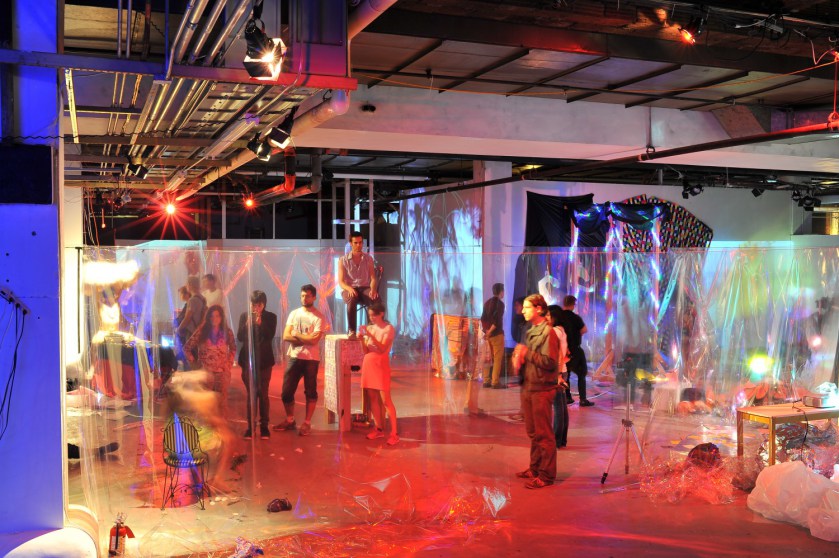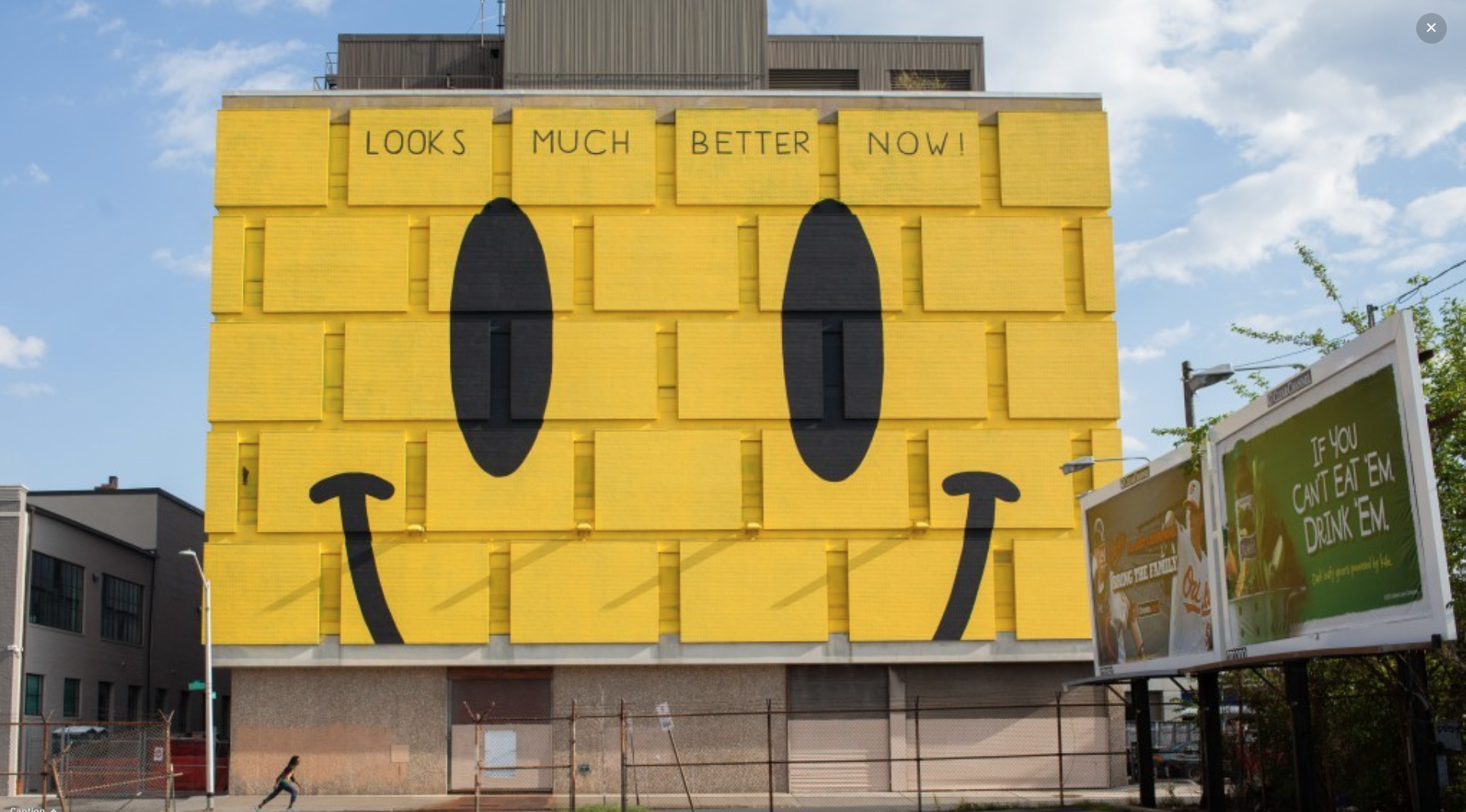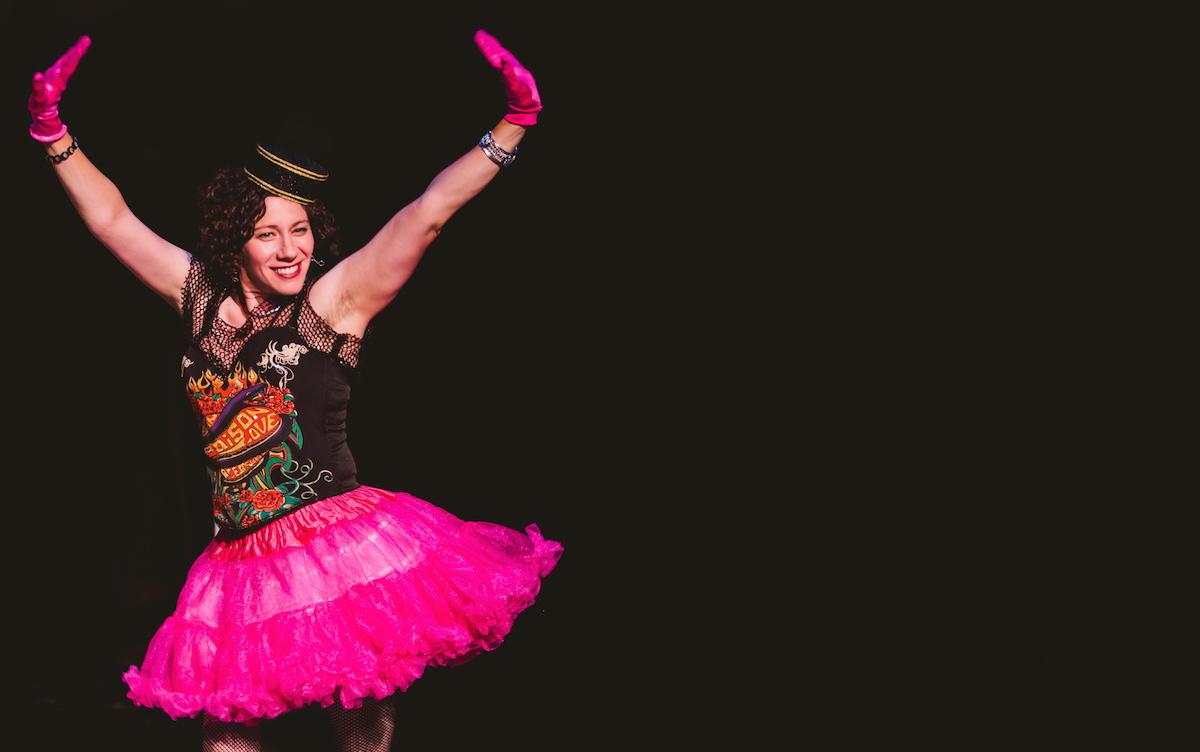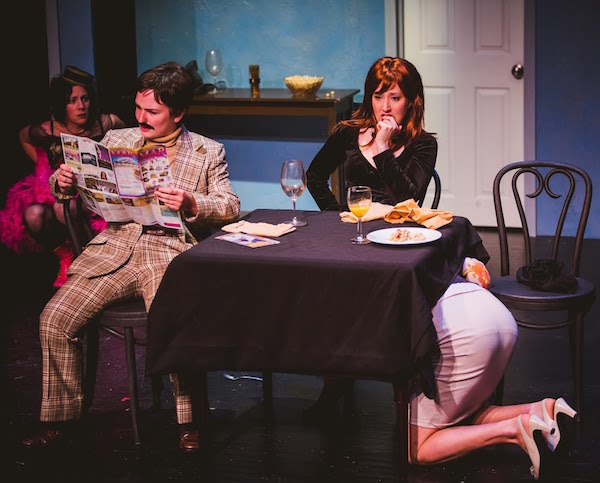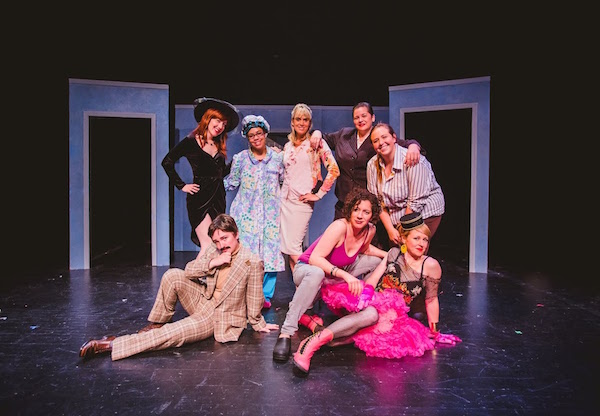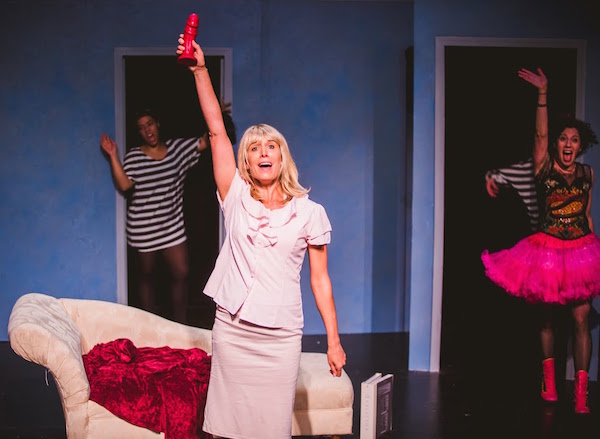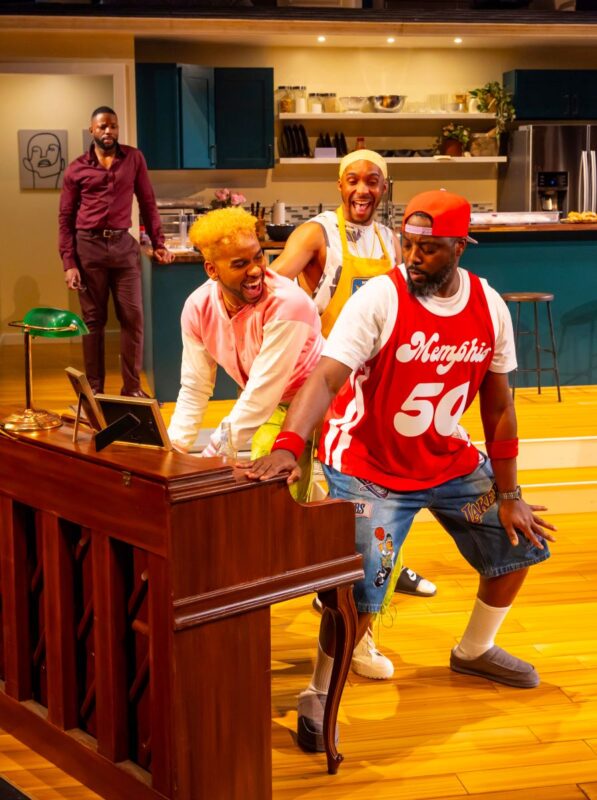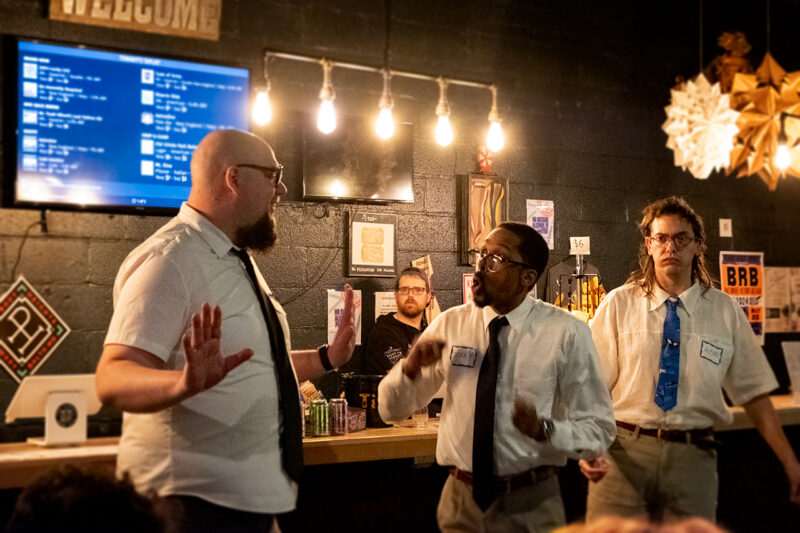The Well of Horniness is madcap crime pastiche and thoughtful on top
By Bret McCabe
By the time Vicki (Elizabeth Scollan) has disappeared underneath the dinner table to get closer to her fiancé’s sister Georgette (Ann Turiano) early on in the Iron Crow Theater’s ribald production of Holly Hughes‘ The Well of Horniness, about a zillion different things have happened to let you know that Well is no ordinary comedy. Or mystery. Or soap opera. Or whatever it is.
A Narrator (Andrea Bush), uh, narrates the proceedings as if a radio announcer describing the play for an audience at home and provides the quick segues into sponsors advertisement, such as the House of Shag ‘N’ Stuff (“Once you see our low, low prices and easy terms, you’ll be bitten by the bug, too—shag fever!). Every time the Narrator mentions the play’s name, which is often, the entire cast lets out a feign gasp of offense.
Every role, including Vicki’s discount carpet salesman fiancé Rod (Kelly Hutchison), is played by a woman. Every scenario and set-up feels like it was partially lifted from a cheap daytime drama, 1980s sitcoms, and low budget crime flicks. And just about every line of dialogue has the potential to run into some kind of pun, double entendre, or other variety of absurdity. The question isn’t when a curveball joke is coming; it’s will you have stopped laughing from the last one in time to catch it.
Almost all of these jokes are unabashedly naughty. Before Vicki disappears beneath the table to take off Georgette’s underwear and then—well, Scollan’s and Turiano’s screwball physical and facial contortions leave little to the imagination—the waitress has asked Vicki, “Miss, are you gonna order anything, or are you just gonna eat hers?” Soon, Georgette follows Vicki to the ladies room, a gun shot rings out and Georgette is left of dead. Vicki is identified as the prime suspect and goes on the lam with the “lady dick” detective Garnet McClit (Katie Hileman) in hot pursuit, which gets even hotter when Garnet meets coat-check girl Babs (Maranda Kosten), Georgette’s former fling.
Well isn’t merely fast paced, it unspools at a sprint, and the plot matters less than the enthusiastic brio that director Julianne Franz, her cast, and the entire production team bring to the material. Well was Hughes first play, staged in 1983 at the Wow Café, a very different time and place. This was years before she—along with Karen Finley, John Fleck, and Tim Miller—would be dubbed the NEA Four, performances artists whose National Endowment for the Arts grant proposals weren’t just vetoed by then NEA chairman John Frohnmayer, the former Repiblican senator from Oregon, the four made out to be the symbols of contemporary artists’ decadent indecency and blasphemy.
Though such culture wars were a few years off, in the winter 2104 issue of The Drama Review Hughes writes, in respect to revisiting Well 30 years later, that with the play she wanted to make people laugh, get the attention of the WO Café, and “take a poke at the anti-porn feminism I had once embraced.” She continues:
“Long before I was denounced by the likes of Senator Jesse Helms, I was getting an earful about the title of this play. I enjoyed being read the riot act by people I mostly agreed with; it was familiar to me, this role, as I was already practiced in the art of being the bad child.”
“Women, I was told, did not get ‘horny,’ and didn’t I know that was a phallic reference? But when I asked what it is that women ‘got,’ what is the word for our desires that doesn’t betray our commitment to feminism, I got no answer. A vast tundra of silence opened. The play is not really an answer either, but it makes a sound, it breaks the silence with laughter, it attempts to place a mark on the landscape of lesbian desire, a landscape that seemed to lack any other landmark, except for Radclyffe Hall’s The Well of Loneliness. I had not read Hall’s 1928 book when I wrote my play. My crude title, a title that keeps repeating throughout the play, is voiced by the entire cast, who are directed to always deliver the line in a full-throated scream. But I didn’t feel I needed to read the book. I felt like I was familiar with loneliness, with darkness.”
Under Franz’ direction Iron Crow’s production recognizes that the “full-throated scream” is played for laughs, but they’re not afraid of the darkness that lurks somewhere behind it. If that scream grows irritating, it should: the cultural fodder for campy offense from the early 1980s shouldn’t feel so pertinent 30 years on, but it’s impressive how many of Hughes’ zingers, in Iron Crow’s handling, still land today.
With a running time of about an hour, watching Well is like taking in an episode of a Netflix TV series, and the play’s wall-to-wall hyperbole still feels contemporary, even if the genres and tropes its lampooning are dated. Costume designing Wil E. Crowther seems to have been inspired by the drab silliness of 1970s TV: gumshoe Garnet dons the finest in wrinkled Columbo schlub-ware; strumpet Babs look like she’s on her way to her Gong Show appearance, and carpet salesman Rod rocks beige plaid ensemble not even James Garner could’ve pulled off in The Rockford Files.
The preposterousness of the wardrobe is echoed in many of the production’s details, including the performances, where the acting is so over the top it’s off the map. Supporting player Chloe Mikala and Scollan, especially, recognize that Well requires bouncing from vaudevillian physical comedy to campy excess at a steady slip, and the entire cast has a field day hitting clichés feminine character types only to erupt into something else.
The whole play starts to feel like it’s taking the piss out of conventional female roles in genre fiction, an issue Hughes touches on in the Autumn 1991 issue of The Drama Review: “Well, the whole form of the detective story was sort of perfected by [Raymond] Chandler. It’s the drama of the evils of female sexuality that unfolds over and over: the existential hero is diverted from his journey to know himself by the treachery of female sexuality.”
In last year’s book Murder Most Queer: The Homicidal Homosexual in American Theater Jordan Schildcrout explores homicidal LGBT characters on the American stage from the 190s to the present, noting how who gets cast as the villain is a function of politics, a situation we understand all to well today. And with this irrepressible production of The Well of Horniness, Iron Crow—which did Baltimore a favor in 2011 when it brought Hughes to town with her solo performance Dog and Pony Show (Bring Your Own Pony)— has a blast poking holes in any attempt to use gender or sexuality as a basis for making any kind of assumption about a human being.
The Well of Horniess runs at the through June 20.
Author Bret McCabe is a haphazard tweeter, epic-fail blogger, and a Baltimore-based arts and culture writer.
